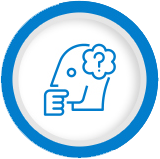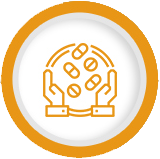Cocaine & Mental Health
What is Cocaine?
Cocaine (coke) is a stimulant drug possessing powerful addictive properties. It is a psychoactive alkaloid of the South American coca plant (Erythroxylum coca). Cocaine is available in two forms – cocaine (the powder) and crack cocaine (the crystalline form).
Cocaine was first extracted from coca leaves to use as a painkiller. As a recreational drug, it is often snorted via the nostrils, inhaled as smoke, and injected directly into the blood. When sniffed, the powder is absorbed through nasal tissues into the bloodstream. It can also be rubbed into the gums or directly ingested.
As the second most abused drug in the world (after cannabis), cocaine is so prevalent that experts agree around 13.2 and 19.7 million cocaine addicts exist worldwide. Around 1.9% of Britain’s population between 16 and 59 years are believed to use powder cocaine, while 3% of those between 16 and 24 are users.

Cocaine’s is sparingly used in medical procedure, as local anaesthesia in some surgeries. In a crude twist, street peddlers mix in cornstarch, flour, sugar, or talcum powder, to fuel profits. Others include amphetamine or synthetic opioids, including fentanyl.
Additives like synthetic opioids are quite risky especially as most do not realise such dangerous elements are part of their cocaine. Tampering with cocaine in this manner is probably responsible for growing reports of overdose deaths among cocaine users.

Cocaine’s Long-term Effects on Mental Health
The addictive nature of cocaine stems from its effect on the brain’s reward pathway. Repeated exposure to cocaine causes the brain to adapt, making this pathway less responsive to natural enforcers. In tandem, the brain circuits involved in stress are increasingly sensitive, causing negative moods and displeasure when the drug becomes unavailable. These are supposed to be withdrawal signs. The user is likely to focus on seeking the drug than on natural rewards, food, or relationships.
Regular use may boost brain tolerance of cocaine, such that higher doses and more frequent use, are both required to elicit a similar level of pleasure and relief from withdrawal initially experienced. Users may also develop sensitisation – needing less cocaine to produce convulsions, anxiety, and several other toxic effects. Tolerance to cocaine reward and sensitisation to cocaine toxicity both raise the propensity to overdose in regular users.
Certain adverse effects have grater possibility of occurrence depending on the route of cocaine administration. Regular snorting can impact sense of smell, swallowing, nasal septum, and speaking. Nosebleeds and chronically-inflamed, runny nose are other common outcomes.
Smoking crack cocaine can make asthma worse and destroy the lungs, while injections leave so-called tracks, mostly in the forearms. Injections, when shared, are also notorious for infectious conditions likes HIV and hepatitis C.
Finally, the drug (or any additives it includes) can induce allergic reactions which may lead to death. Vital body organs start to suffer – an example being diminished flow of blood to the gastrointestinal tract, causing tears and ulcerations. Malnourishment, significant weight loss, cardiovascular and neurological complications, are common physiological adversities that long-term cocaine use can bring about. This is not to mention impaired cognitive functions and high risk of relapse that even mild exposure can trigger.
- none Easy
- none Confidential
- none Lifetime Support
Psychosis & Hallucinations as a Side Effect of Cocaine Use
People using cocaine are impacted in different ways. For some, they end up happier and markedly sociable. Others experience schizophrenia-like symptoms or the effects of paranoia. Cocaine psychosis is a lethal side effect of sustained cocaine use. Raised energy levels, a false sense of well-being, and a feeling of euphoria are common results of cocaine use. This unfortunate process begins with a telling alteration of how the brain communicates with the rest of the body.
Psychosis is not the root problem however. It is a symptom of a few mental health anomalies and can also produce hallucinations. There is an abyss-like crash after a high wears out. Cocaine can be effective for up to one hour. Diminishing cocaine influence causes dopamine deficiency when the neurotransmitter is in short supply. Depression and anxiety follows such episodes. Used over and extended period, cocaine-induced psychosis results.
The severity of cocaine-induced psychosis varies with the frequency of use. Cocaine-induced paranoia shares similar symptoms with mental health disorders like bipolar disorder and schizophrenia. These symptoms include anger, hallucinations, homicidal or suicidal thoughts, and inordinate thoughts. Hallucinations impede a user’s ability to objectively manage real dangers. Environmental signs like road signs and traffic lights can be ignored due to their focus on something else unreal.


Cocaine & Dual Diagnosis
The National Alliance on Mental Illness (NAMI) defines dual diagnosis as a person’s simultaneous experience of substance use disorder and severe mental illness. Dual diagnosis is professionally-ascertained yet as a simple concept, it is not yet completely understood. In essence, dual diagnosis treats people suffering form both an addiction and a psychiatric disorder.
45 percent of people with addiction, by the National Survey on Drug Use and Health (NSDUH) research, have a co-occurring mental health disorder. Addictions may include drugs, sex, alcohol, or a combination of things. Psychiatric disorders may however include depression, borderline personality disorder, and obsessive compulsive behaviour (OCD), amongst others.
Temporary symptoms of psychosis like hallucinations and paranoia can result from sustained cocaine use, a condition called cocaine-induced psychosis. It is not very distinct from schizophrenia and 48-88% of cocaine users exhibit the condition.
Two disorders obviously complicate issues as mental health can be adversely impacted by cocaine abuse. Cocaine addiction commonly occurs in tandem with mental illness, such that dual diagnosis determines treatment engagement and outcomes (mostly if unrecognised and treated precisely).
Cocaine Use Disorder & Bipolar Disorder
Probably half of those with bipolar disorder battle addiction. It is also tempting to self-medicate, as with any other disorder. Alcohol and drugs provide momentary escape from manic episodes and emotional situations for victims of bipolar disorder.
Bipolar disorder influences cocaine dependence in people to a prevalence rate of 15-39%. Substance use in bipolar disorder results in largely negative outcomes – less adherence to medications, more hospitalisations, and more aggression. Brain function is decidedly more impaired in co-occurring cocaine use disorder and bipolar disorder, than in bipolar disorder alone. Thus, this dual diagnosis is a very strong risk factor for poor treatment adherence among those with bipolar disorder.
Introducing foreign-body, mind-altering chemicals into the brain puts mental stability on a shaky foot. The substance-induced high has an inevitable low that accompanies it. Eventually, the pristine brain cave in to foreign powers. Common issues that may hinder treatment adherence in cocaine abuse and bipolar disorder include:
- poor decision skills
- heavy attention deficit
- poor cognition
- impulsiveness
- inability to plan ahead

Addiction is a devastating illness which can put all your relationships and your career in chaos. To help you recover and enjoy life again, we strive to heal both you and your relationships. Call us now to begin the road to recovery today!
Get Help Immediatley, Call Now!

Cocaine & Depression
One in ten adults in the United States have reported suffering from depression. Many antidepressants work by boosting neurotransmitter production to elevate mood. This leads many to seek self-medication in a bid to feel better. Self-medicating, many turn to illicit drugs like cocaine, but rather than experience relief, they plunge deeper into the abyss of depression. The crash after each high is more devastating for those with a prior depressive condition.
It remains unclear whether depression precedes addiction or vice versa. It is also unclear if cocaine kills brain cells or merely impairs them. The 10-20% drop in reward-pleasure centre neurons is bad news for addicts and could suggest why depression rates among cocaine users is rather high.
Depression suggests a lack of neurotransmitters in brain pleasure centres or at least smaller proportions. Depression may occur with cocaine users, through a suppression of their body’s natural production of salient brain chemicals. Depressed patients on the other hand, may seek relief from drugs such as cocaine. Cocaine withdrawal can also breed intense depression feelings.
People seeking treatment for cocaine abuse with simultaneous depression show a lifetime prevalence rate in the range 25-61%. Compared to non-depressed users, depressed users may be given to more intense euphoria, greater cravings, and withdrawals when they do not use.
These factors possibly contribute to heightened cocaine dependency among depressed users. Depression is also responsible for effects that subsequently complicate recovery from cocaine addiction. These include persistent negative thoughts, faulty thinking, hopelessness, low energy levels, restlessness, and insomnia.
Cocaine & Violent Episodes
Why does cocaine lead to violence? First understand that it stimulates the central nervous system, producing intense euphoria accompanied by the illusion of strength and intellectual prowess. It simultaneously suppresses pain, fatigue, and appetite, while toning down inhibitions. These effects soon wear off anyway, the user becoming anxious, agitated, and craving for more of the drug.
These effects make the user prone to violent acts. Users of crack cocaine are apparently more angry and violent than those who snort the crystalline powder. Researchers are of the opinion that the rage and violent behaviour stemming from cocaine use might be linked with the drug’s impact on neurotransmitters in the brain’s pleasure centres.
There is also suspicion that cocaine alters the levels of norepinephrine and serotonin that could inspire aggressive behaviour, hyperactivity, paranoia, and impaired judgement.
Several studies link violent or aggressive behaviour with cocaine use. Up to 55% of patients with cocaine-induced psychiatric symptoms exhibit violent behaviour. Cocaine use has been implicated in homicide in as many as 31% of homicide victims. In cases of suicide, cocaine has been involved in at least 18% of cases, with an upper limit of 22%. Numerous patients with cocaine dependence have been found to have a comorbid psychiatric disorder.


How is Cocaine-Related Dual Diagnosis Treated?
Prescribed antidepressants are most potent where the activating effect profile is similar to cocaine’s. Depressed users are to avoid sedating medication, as it could multiply the underlying mood disorder. More stimulating antidepressants as desipramine and buproprion have better potential for recovering cocaine users.
Treatment for co-occurring cocaine abuse and depression must deal with both issues at once. There is extensive evidence to support combining therapy and administration of antidepressant medication.
Treatment of concurrent cocaine use disorder and bipolar disorder involves medication management and therapy. Medication must be monitored so there is no reaction between any for cocaine cravings and any bipolar medication. It is crucial that during cognitive behavioural therapy in treating co-occurring cocaine use disorder and bipolar disorder, potential cognitive impairments in the patient is factored in and treatment plan tweaked accordingly.
A low-priced supplement, Citicoline, reduces cocaine cravings with no known drug-drug interactions. It is suitable for patients suffering from comorbid bipolar disorder and needing medication for their bipolar symptoms.
Cognitive behavioural therapy (CBT) is effective in treating a dual diagnosis of cocaine abuse and depression. Equally effective is motivational interviewing. CBT hopes to alter the mental disposition of the addicted person, while keeping maladaptive drug use behaviour in response to stressors and other resulting life events.
Locating a rehab program to treat both the substance abuse and mental health disorder simultaneously is recommended. Recovery can be very difficult if the patient is not able to find such a program or treatment centre using an integrated approach. In fact, it might hasten relapse.
Typical elements of the treatment include:
- Detox
- Behavioural therapy – integrated group therapy, dialectical behaviour therapy,psychotherapy, and cognitive behavioural therapy.
- Medication – after assessing mental health, lithium (bipolar disorder), anticonvulsants(stabilise mood), topiramate (cocaine addiction and anxiety), buspirone (anxiety and alcohol abuse), and selective serotonin reuptake inhibitors (anxiety and alcohol abuse).
On completing treatment we offer lifetime support for your recovery.
Strict client confidentiality policy is in place.
Simply give us a call and we will guide you through the process.
FAQ
How does cocaine affect mental health? (overall character changes, behavioural)
Cocaine addiction hampers brain activity in regions connected to emotional processing and error awareness. Social interaction is problematic for cocaine abusers. They start to place more premium on their own benefits while interacting with others and less concern for the consequences of their behaviours for themselves and those around them. Thus, the have a weakened awareness of how they make others feel around them.
Cocaine-dependent individuals also exhibit blunted emotions and egocentrism. Their risk of developing an anti-social personality disorder is increased 22 times that of non-users.
This reduced error recognition and impaired emotional/social processing can be regarded as an issue of self-awareness, and occurs in several other psychological disorders.
Without adequate social skills, the development and outcome of mental disorders, plus stimulant use disorders ensures cocaine-induced impairment constitutes a peculiar challenge to dual diagnosis treatment.
What are some mental health consequences of cocaine use? (example of events, diseases, disorders)
Any substance that affects the brain impacts mental health. Cocaine addiction changes the brain and disrupts normal brain patterns. While the drug is active in an individual’s system, it affects mental health. Short term negative mental effects are confusion, paranoia, agitation, panic, anxiety, erratic, and violent inclinations. Repeated short term effects turn to long term effects.
This study by World Psychiatry finds withdrawal to have profound effects in cocaine use. Medically, this is known as anhedonia – the inability to feel pleasure. Thus, whatever felt pleasurable before embarking on the cocaine trail no longer feels pleasurable.
Cocaine floods the dopamine receptors of the brain. The floods impact the proper functioning of these centres because there is less dopamine than required in them. Anhedonia is not treatable and is linked to depression, anxiety, and psychosis. Dopamine receptors eventually return to normal, but the mental illness has grown roots too deep.
Other long-term effects include great mental exhaustion, intense cravings for cocaine, depression, anxiety, increased hunger, nightmares, chills, nerve pain, muscle aches, and difficulty in concentration.
How does cocaine withdrawal affect mental health?
This study by World Psychiatry finds withdrawal to have profound effects in cocaine use. Medically, this is known as anhedonia – the inability to feel pleasure. Thus, whatever felt pleasurable before embarking on the cocaine trail no longer feels pleasurable.
Cocaine floods the dopamine receptors of the brain. The floods impact the proper functioning of these centres because there is less dopamine than required in them. Anhedonia is not treatable and is linked to depression, anxiety, and psychosis. Dopamine receptors eventually return to normal, but the mental illness has grown roots too deep.
Other long-term effects include great mental exhaustion, intense cravings for cocaine, depression, anxiety, increased hunger, nightmares, chills, nerve pain, muscle aches, and difficulty in concentration.
Can cocaine be mixed with antidepressants?
Mixing other drugs with antidepressants (like citalopram and sertraline) leads to adverse reactions. Only prescription medicines should only be taken when the antidepressant has been flushed out of the system completely. In the case of cocaine, mixing with antidepressants leads to the so-called serotonin syndrome. There is suddenly an overload of serotonin in the brain leading to surpassing euphoria lasting only a few minutes. A continual craving of this feeling is dangerous for the patient.
Can cocaine use affect bipolar disorder?
People with bipolar disorder can live long, healthy, and happy lives. There is potent medication to check symptoms, and therapy can help people know and understand the accompanying triggers that lead to dysfunctional thoughts and mood shifts in bipolar disorder.
Cocaine (and crack) might seem like an excellent idea, but it only worsens the underlying bipolar condition by dragging the individual deeper into a vicious circle of mania, depression, mood shifts, and highs.





